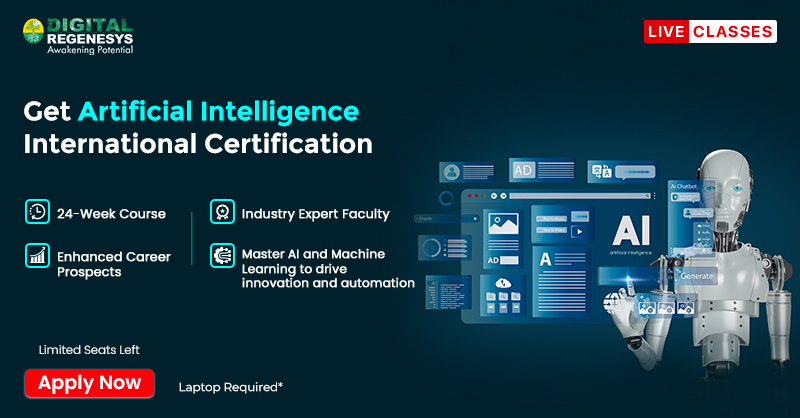What Are the Best Jobs in Artificial Intelligence?

Artificial Intelligence (AI) refers to systems that perform tasks usually requiring human intelligence: recognising speech, learning from data, making predictions, or interpreting visual content. Its growth has accelerated in industries like finance, healthcare, retail, automotive, and technology, where AI systems are rewriting how decisions are made, how operations scale, and how user experience is delivered. Demand for professionals who understand AI’s methods, tools, limitations and possibilities is steadily increasing. Organisations require people who can build, maintain, and govern such systems.
In this article, we will help to answer what the best jobs in artificial intelligence are, what these roles involve, what skills they require, salary expectations, and whether pursuing a career in Artificial Intelligence is worth the investment.
Why Consider a Career in Artificial Intelligence?
Artificial Intelligence is transforming industries, governments, research, and society at large. For professionals seeking the best jobs in artificial intelligence, understanding the broader context is essential. AI is no longer a niche field; it is a driving force behind innovation, efficiency, and decision-making in organisations worldwide. This expansion creates opportunities for skilled individuals to specialise, contribute to cutting-edge projects, and remain competitive in the evolving job market.
The following points illustrate why exploring the best jobs in artificial intelligence is relevant for professionals today:
1. Global demand
Organisations worldwide are investing in AI to improve efficiency, automate tasks, enhance customer experiences, and generate actionable insights from data.
2. Future-proofing
As digital transformation accelerates, AI roles are likely to grow, adapt, and remain relevant over the coming decade.
3. Job creation and transformation
AI does not just replace roles – it creates new opportunities in development, deployment, oversight, ethics, and policy.
4. South African and global context
Both locally and internationally, AI skills are increasingly sought after, offering professionals the chance to work on innovative projects across industries
As you explore the best jobs in artificial intelligence, it becomes clear that gaining expertise in this field positions professionals to take advantage of emerging opportunities and technological advancements.
Read more on Why do Companies Value Employees with Artificial Intelligence Course Certificates? here

What Are the Best Jobs in Artificial Intelligence?
Understanding the best jobs in artificial intelligence involves examining the roles that drive innovation and transformation across various industries. AI is not a single skill or task; it encompasses a range of specialisations, from developing intelligent algorithms to managing AI products and ensuring ethical deployment.
Professionals who master these areas are highly sought after in technology, finance, healthcare, retail, and government. The following roles are among the most in demand globally and in South Africa, reflecting both the diversity of AI applications and the opportunities for career growth.
Listed below are some of the best jobs in Artificial Intelligence, and include salary figures, which have been gathered from multiple sources. These figures are updated as of September 2025.
1. Machine Learning Engineer
When researching the best jobs in Artificial Intelligence, one of the top roles is that of a Machine Learning Engineer. They help to build models that allow software to learn from data. They implement algorithms, handle large datasets, tune performance, and ensure that models are efficient, accurate, and maintainable.
- Industries hiring ML Engineers: Tech companies, finance (algorithmic trading, risk), healthcare (diagnostics), retail (recommendation engines), automotive (autonomous systems).
- Core skills: Python; frameworks like TensorFlow or PyTorch; data modelling; statistics; model deployment (e.g. Docker, cloud platforms).
- Salary: R 1,361,556
2. Data Scientist
Data Scientists analyse and interpret complex data to help organisations make decisions. They build predictive models, perform statistical analysis, clean and visualise data, and often work cross-functionally.
- Industries: Finance, retail, public policy, healthcare, marketing, logistics.
- Skills required: Statistics; programming (Python, R); SQL; visualisation tools; understanding of ML algorithms.
- Salary: R 442,185
3. AI Research Scientist
Another role that comes up frequently when searching for the best jobs in Artificial Intelligence is an AI Research Scientist. They help to push the boundaries of what AI can do. They invent new models, publish papers, and experiment with novel architectures, often leading to advancement in AI theory and practice.
- Employers: Universities, research labs, large tech companies, AI labs.
- Required skills: Deep learning; strong mathematics (linear algebra, calculus); programming; familiarity with research methodologies; ability to write papers.
- Salary: R 893,934
4. Natural Language Processing (NLP) Engineer
NLP Engineers work with text and speech and help in building chatbots, translation systems, speech recognition, sentiment analysis, and search tools.
- Applications: Customer support automation; legal tech; healthcare (medical transcription, patient communication); virtual assistants.
- Skills needed: Linguistics or computational linguistics; NLP libraries like NLTK, SpaCy, HuggingFace; deep learning for transformers; handling text preprocessing.
- Salary: R 802,267
5. Robotics Engineer (AI-Driven Robotics)
These specialists design and build robots and systems that perceive the environment, plan actions, and adapt behaviour.
- Industries: Manufacturing, logistics, automotive, warehousing, and agriculture.
- Skills: Mechanical/electrical engineering; control systems; AI for perception (computer vision, sensor fusion); embedded programming; robotics frameworks (ROS).
- Salary ranges: R 734,179
6. AI Product Manager
AI Product Managers bridge the technical and business worlds. They define AI product strategy, ensure that models meet business needs, guide teams, and ensure that deployment and maintenance align with goals.
- Industries: Technology firms; financial services; enterprise software; startups.
- Skills: Project management; understanding AI/ML workflows; communication; user experience; stakeholder management.
- Salary insights: These roles often receive both base salary and bonus. In global markets, senior AI Product Managers may earn similar or more than senior engineers. Locally, depending on the size of the company, could range in the upper half of senior data roles.
7. AI Ethics and Policy Specialist
With increasing concern about responsible AI, bias, fairness, regulation and governance, roles in ethics and policy are growing.
- Importance in: Regulated sectors like healthcare, finance, government, and technology corporations with global reach.
- Skills: Understanding of AI ethics frameworks; knowledge of relevant regulation; ability to audit AI models; strong communication and cross-disciplinary thinking.
- Salary overview: Often less technical but valued; entry roles might be lower than engineering roles, senior ethics/policy leads can command solid compensation, especially in organisations that place a high priority on compliance and ethical AI practices.
Skills Needed for Success in AI Careers
For professionals exploring the best jobs in artificial intelligence, understanding the required skill set is critical. AI roles demand a combination of technical expertise, mathematical knowledge, and strong interpersonal abilities. Success is not solely about coding or algorithms; it also requires analytical thinking, problem-solving, and the ability to communicate complex concepts clearly.
Whether aiming to become a Machine Learning Engineer, Data Scientist, or AI Product Manager, building a well-rounded skill portfolio increases employability and prepares you for diverse AI challenges.
The core skills for success in AI careers include:
1. Technical skills
-
- Programming languages such as Python, R, and Java
- Machine learning frameworks, including TensorFlow and PyTorch
- Tools for data manipulation and visualisation like SQL, Pandas, and Matplotlib/Seaborn
- Experience with model deployment, cloud platforms, and version control systems
2. Mathematical foundation
-
- Statistics and probability
- Linear algebra and calculus
- Algorithmic thinking and data theory
3. Business and soft skills
-
- Problem-solving and curiosity to explore complex AI challenges
- Communication skills to explain technical concepts to non-technical stakeholders
- Teamwork, collaboration, and project management capabilities
Developing these skills helps professionals position themselves strongly when exploring the best jobs in artificial intelligence, ensuring readiness for both technical and strategic responsibilities in AI roles.
Read more on Why Study Artificial Intelligence?- Career Growth & Job Opportunities in AI! here
Is It Worth Pursuing a Career in Artificial Intelligence?
For professionals evaluating the best jobs in artificial intelligence, the potential return on investment (ROI) is a crucial consideration. AI is central to digital transformation, automation, customer experience, and decision-making across industries. Investing time and effort to gain AI expertise can lead to long-term career stability and growth opportunities.
Listed below are some factors that professionals should consider if they are pondering whether they should upskill in AI:
1. Career longevity and stability
AI roles are in high demand globally and across sectors. Professionals who build AI skills position themselves for sustained relevance in the workforce.
2. Opportunities for innovation
AI careers allow engagement with cutting-edge challenges, including developing new models, addressing ethical considerations, and exploring emerging applications such as computer vision and generative AI.
3. Growth across industries
From healthcare and finance to retail, manufacturing, and government, AI skills are increasingly sought after, offering diverse career pathways.
4. Professional and financial rewards
While entry-level roles may require experience building practical skills, the ROI can be substantial. Specialisation, hands-on projects, and proficiency with real-world AI tools significantly increase both employability and earning potential.
Read more on How to Start a Career in Artificial Intelligence: Key Steps and Skills here
Conclusion
Exploring the best jobs in artificial intelligence reveals a field rich with opportunity, innovation, and professional growth. AI is transforming industries worldwide, and roles such as Machine Learning Engineer, Data Scientist, NLP Engineer, and AI Product Manager offer both technical challenge and career stability. By investing in the right skills, practical experience, and industry-recognised training, professionals can maximise their return on investment (ROI), securing high-value positions and long-term relevance in the evolving digital economy.
The Digital Regenesys Artificial Intelligence Certification Course provides a structured pathway to gain these skills. With hands-on projects, flexible learning options, and globally recognised certification, the course equips professionals to enter top AI roles confidently and with measurable career ROI.
Visit the Digital Regenesys website today to learn more about our course and enrol today!
Last Updated: 30 September 2025
